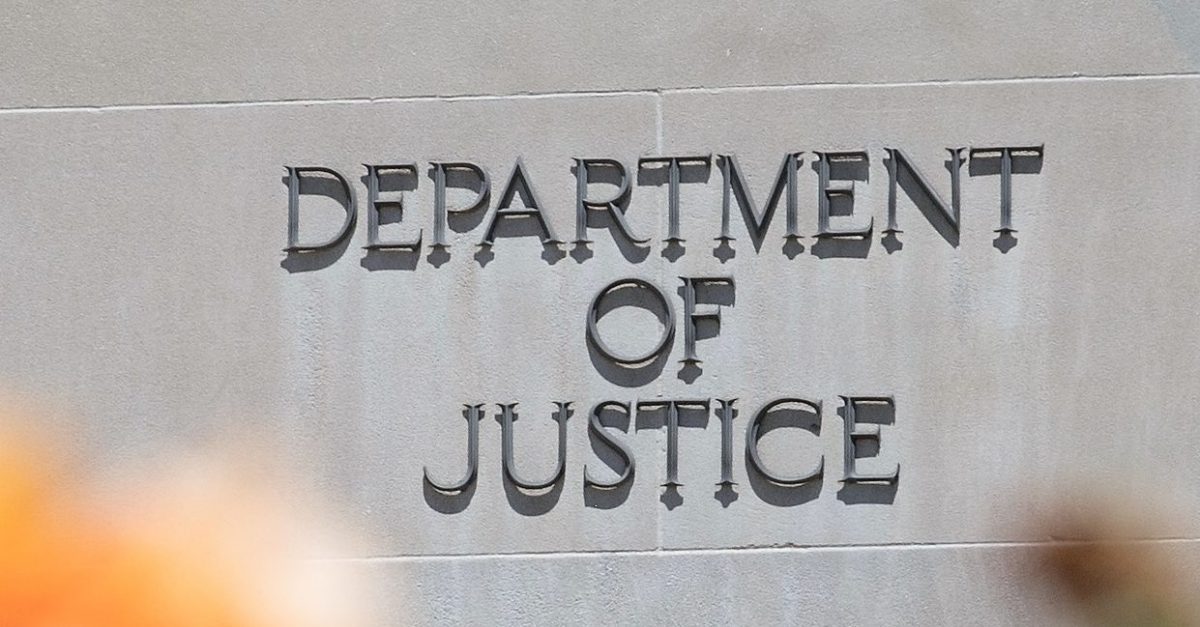
Attorneys from the Department of Justice (DOJ) on Wednesday told a federal judge that the court does not have the authority to temporarily postpone in-person court proceedings for immigrants detained by the government despite Centers for Disease Control and Prevention (CDC) guidelines amid the COVID-19 coronavirus pandemic, the National Law Journal reported.
A coalition of immigrant rights advocacy groups and several detainees filed a lawsuit earlier in April seeking to halt in-person immigration hearings due to the health risk posed by the virus. The groups filed a motion last week asking the court to temporarily pause the proceedings to allow the DOJ’s Executive Office for Immigration Review (EOIR)–the executive branch office that oversees the courts–to implement proper safety protocols and procedures.
The plaintiffs said the temporary restraining order on the proceedings was not just to protect migrants, but judges, attorneys, and others who would be forced to otherwise disregard social distancing recommendations and guidelines.
In phone arguments held Wednesday, U.S. District Judge Carl Nichols of the District of Columbia asked the DOJ’s attorneys if the EOIR could unilaterally prevent immigration judges from postponing cases due to the pandemic.
“If EOIR issued guidance to immigration judges directing them to never grant a request for continuance based on the coronavirus, is it your view that directive would be unreviewable because of the INA [Immigration and Nationality Act] provisions, except in connection with the individual case?” Nichols asked.
Under the INA, immigration cases must first exhaust all possible options in the immigration court system before they can be brought to federal court.
After DOJ attorney Brian Ward told Nichols that was indeed the case, he and colleague Alex Halaska argued that an immigration court issuing an expansive order postponing immigration proceedings across the U.S. would be inappropriate.
“Ward further argued that, just as the federal judiciary has allowed individual courts and judges to make determinations on what kind of hearings should be held during the pandemic, immigration courts and judges should be given that same level of flexibility,” the National Law Journal reported.
Plaintiffs’ attorneys responded by saying they merely wanted Nichols to order the EOIR to temporarily halt proceedings in the immigration courts until such time as they could announce “appropriate national guidance to ensure the health and safety” of those who would be participating in the hearings. Attorney Matthew Slater countered the DOJ lawyers by saying that there was no way Congress had intended the INA to be “a suicide pact or a death trap.”
As previously reported by Law&Crime, the EOIR has been accused of consistently failing to protect participants in immigration court proceedings during the pandemic.
In March, the National Association of Immigration Judges (NAIJ) accused the EOIR of failing to inform immigration judges working out of the Newark, New Jersey court that one of the Immigration and Customs Enforcement (ICE) prosecutors who worked in the building had recently tested positive for the virus, even after the office notified and sent home other employees in the building who worked for a different agency. The immigration judges only learned of the ICE prosecutor’s positive test after several of them obtained the other agency’s notification email and began forwarding it amongst themselves.
The office was also accused of taking actions that may have contributed to the spread of the virus among immigrant communities when they ordered immigration court staffs to remove posters from the Center for Disease Control and Prevention aimed which informed people in English and Spanish of steps to take to avoid contracting or spreading the contagion.
[image via Alex Wroblewski/Getty Images]
Have a tip we should know? [email protected]